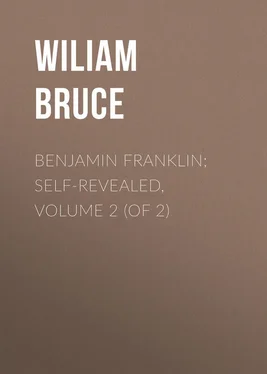Wiliam Bruce - Benjamin Franklin; Self-Revealed, Volume 2 (of 2)
Здесь есть возможность читать онлайн «Wiliam Bruce - Benjamin Franklin; Self-Revealed, Volume 2 (of 2)» — ознакомительный отрывок электронной книги совершенно бесплатно, а после прочтения отрывка купить полную версию. В некоторых случаях можно слушать аудио, скачать через торрент в формате fb2 и присутствует краткое содержание. Жанр: foreign_antique, foreign_prose, на английском языке. Описание произведения, (предисловие) а так же отзывы посетителей доступны на портале библиотеки ЛибКат.
- Название:Benjamin Franklin; Self-Revealed, Volume 2 (of 2)
- Автор:
- Жанр:
- Год:неизвестен
- ISBN:нет данных
- Рейтинг книги:4 / 5. Голосов: 1
-
Избранное:Добавить в избранное
- Отзывы:
-
Ваша оценка:
- 80
- 1
- 2
- 3
- 4
- 5
Benjamin Franklin; Self-Revealed, Volume 2 (of 2): краткое содержание, описание и аннотация
Предлагаем к чтению аннотацию, описание, краткое содержание или предисловие (зависит от того, что написал сам автор книги «Benjamin Franklin; Self-Revealed, Volume 2 (of 2)»). Если вы не нашли необходимую информацию о книге — напишите в комментариях, мы постараемся отыскать её.
Benjamin Franklin; Self-Revealed, Volume 2 (of 2) — читать онлайн ознакомительный отрывок
Ниже представлен текст книги, разбитый по страницам. Система сохранения места последней прочитанной страницы, позволяет с удобством читать онлайн бесплатно книгу «Benjamin Franklin; Self-Revealed, Volume 2 (of 2)», без необходимости каждый раз заново искать на чём Вы остановились. Поставьте закладку, и сможете в любой момент перейти на страницу, на которой закончили чтение.
Интервал:
Закладка:
In his youth he adopted the Socratic method of argument, and grew, he tells us in the Autobiography , very artful and expert in drawing people, even of superior knowledge, into concessions, the consequences of which they did not foresee, entangling them in difficulties out of which they could not extricate themselves, and so obtaining victories that neither he nor his cause always deserved. But, in a few years, he discovered that these victories were Pyrrhic victories, and he gradually left off this doubtful kind of dialectics, retaining only the habit of expressing himself in terms of modest diffidence, never using when he advanced anything, that might possibly be disputed, the words "certainly," "undoubtedly" or any others that gave the air of positiveness to an opinion, but rather saying "I conceive" or "apprehend" a thing to be so and so; "it appears to me," or "I should think it is so or so" for such and such reasons; or "I imagine it to be so," or "it is so if I am not mistaken."
As the chief ends of conversation [he declared] are to inform or to be informed , to please or to persuade , I wish well-meaning, sensible men would not lessen their power of doing good by a positive, assuming manner, that seldom fails to disgust, tends to create opposition, and to defeat every one of those purposes for which speech was given to us, to wit, giving or receiving information or pleasure.
And that Franklin completely succeeded in rooting out the last vestige of dogmatism in his nature we not only have his testimony but that of Jefferson, who was not even born when he resolved to do it. "It was one of the rules which, above all others, made Dr. Franklin the most amiable of men in society," he said, "never to contradict anybody." Long before this, when Franklin was only in his forty-fifth year, James Logan wrote of him to Peter Collinson in these words: "Our Benjamin Franklin is certainly an extraordinary man, one of a singular good judgment, but of equal modesty."
How noble was his capacity for self-effacement in the investigation of truth we shall see later on. In this place, it is enough to say that even the adulation poured out upon him in France did not in the slightest degree turn his head. He accepted it with the ingenuous pleasure with which he accepted everything that tended to confirm his impression that life was a game fully worth the candle, but, much as he loved France and the French, ready as he was to take a sip of everything that Paris pronounced exquisite, celestial or divine, it is manifest enough that he regarded with no little amusement the effort of French hyperbole to assign to him the rôle of Jupiter Tonans. When Felix Nogaret submitted to him his French version of Turgot's epigram, "Eripuit cælo fulmen, sceptrumque tyrannis," Franklin, after acknowledging the flood of compliments that he could never hope to merit, with which the writer had overwhelmed him in his letter, added, "I will only call your attention to two inaccuracies in the original line. In spite of my electrical experiments, the lightning descends just the same before my very nose and beard, and, as to tyrants, there have been more than a million of us engaged in snatching his sceptre from him." His pen, however, was wasting its breath when it attempted to convince a Frenchman of that day that his countrymen did not owe their liberties solely to him. If the French had not been too generous and well-bred to remind him of the millions of livres obtained by him from the French King for the support of the American cause, he might have found it more difficult to deny that he was the real captor of Cornwallis.
How heartily Franklin hated disputation we have already had some occasion to see. This aversion is repeatedly expressed in the Autobiography . Referring to his arguments with Collins, he tells us in one place that the disputatious turn of mind
is apt to become a very bad habit, making people often extremely disagreeable in company by the contradiction that is necessary to bring it into practice; and thence, besides souring and spoiling the conversation, is productive of disgusts and perhaps enmities where you may have occasion for friendship.
In another place, he has this to say of the contentious Governor Morris, one of the Colonial governors of Pennsylvania:
He had some reason for loving to dispute, being eloquent, an acute sophister, and, therefore, generally successful in argumentative conversation. He had been brought up to it from a boy, his father, as I have heard, accustoming his children to dispute with one another for his diversion, while sitting at table after dinner; but I think the practice was not wise; for, in the course of my observation, these disputing, contradicting, and confuting people are generally unfortunate in their affairs. They get victory sometimes, but they never get good will, which would be of more use to them.
The same thought is stated in a letter from Franklin to Robert Morris in which the former told the latter that he would see, on comparing a letter which Franklin had written, with the answer, that, if he had replied, which he could easily have done, a dispute might have arisen out of it, in which, if he had got the better, he should perhaps have got nothing else.
Facetious and agreeable as he was, he was likewise free from the unsocial habit of monopolizing conversation:
The great secret of succeeding in conversation, [he declared], is to admire little, to hear much; always to distrust our own reason, and sometimes that of our friends; never to pretend to wit, but to make that of others appear as much as possibly we can; to hearken to what is said, and to answer to the purpose.
Nor, in making or borrowing these just observations, was Franklin like Carlyle who has been wittily said to have preached the doctrine of silence in thirty volumes. What he preached in these respects, he practised.
He was friendly and agreeable in conversation [Miss Logan tells us], which he suited to his company, appearing to wish to benefit his hearers. I could readily believe that he heard nothing of consequence himself but what he turned to the account he desired, and in his turn profited by the conversation of others.
It is hardly just to Franklin, however, to portray his social character negatively. The truth is, as the extracts from his correspondence have clearly enough shown, he was one of the most companionable and one of the kindest and most sympathetic and affectionate of human beings. He detested wrangling and discord. He had no patience with malice, and refused to allow the Pennsylvania Gazette to be made a vehicle for detraction. To tell a chronic grumbler that he was hurt by his "voluminous complaints," or to write to a friend that he would have sent him a longer letter but for the coming in of a bavard who had worried him till evening was about as close as he ever got to fretfulness. There is testimony to the effect that he never uttered a hasty or angry word to any member of his household, servant or otherwise. Even where he had strong reasons for resentment, he was remarkably just, generous and forgiving. Speaking in the Autobiography of the manner in which he had been deceived by Governor Keith, he had only these mild words of reproof for him:
He wish'd to please everybody; and, having little to give, he gave expectations. He was otherwise an ingenious, sensible man, a pretty good writer, and a good governor for the people, tho' not for his constituents, the proprietaries, whose instructions he sometimes disregarded. Several of our best laws were of his planning and passed during his administration.
When Bradford was Postmaster, he refused to allow his post-riders to carry any newspaper but his own. When the tables were turned, and Franklin was in the position as Postmaster himself to shut out every publication from the mails except his Gazette , he declined to retaliate on Bradford's meanness. Drained of money, as he was by Ralph, when they were in London together, he nevertheless summed up the situation in the Autobiography with the charitable statement: "I lov'd him, notwithstanding, for he had many amiable qualities." If there was any person for whom Franklin entertained, and had just cause to entertain, a bitter feeling of contempt and dislike, it was Thomas Penn. Yet, when Lady Penn solicited his assistance, for the protection of her interests in Pennsylvania, after the Proprietary Government in that Province had collapsed with the royal authority, he did all that he could properly do to aid her.
Читать дальшеИнтервал:
Закладка:
Похожие книги на «Benjamin Franklin; Self-Revealed, Volume 2 (of 2)»
Представляем Вашему вниманию похожие книги на «Benjamin Franklin; Self-Revealed, Volume 2 (of 2)» списком для выбора. Мы отобрали схожую по названию и смыслу литературу в надежде предоставить читателям больше вариантов отыскать новые, интересные, ещё непрочитанные произведения.
Обсуждение, отзывы о книге «Benjamin Franklin; Self-Revealed, Volume 2 (of 2)» и просто собственные мнения читателей. Оставьте ваши комментарии, напишите, что Вы думаете о произведении, его смысле или главных героях. Укажите что конкретно понравилось, а что нет, и почему Вы так считаете.










![Benjamin Franklin - Memoirs of Benjamin Franklin; Written by Himself. [Vol. 2 of 2]](/books/747975/benjamin-franklin-memoirs-of-benjamin-franklin-wr-thumb.webp)
![Benjamin Franklin - Memoirs of Benjamin Franklin; Written by Himself. [Vol. 1 of 2]](/books/748053/benjamin-franklin-memoirs-of-benjamin-franklin-wr-thumb.webp)
